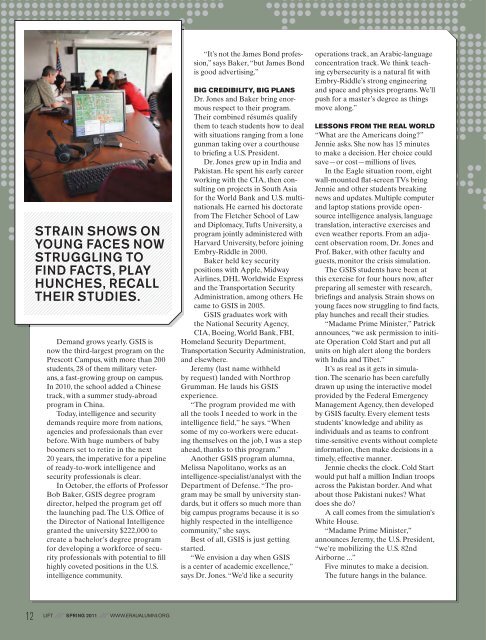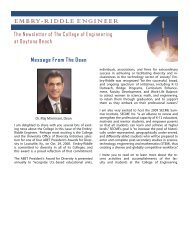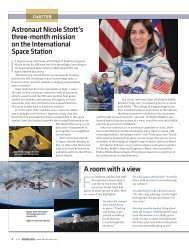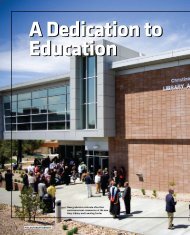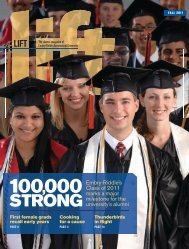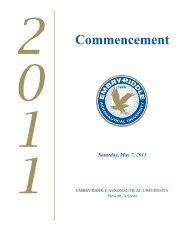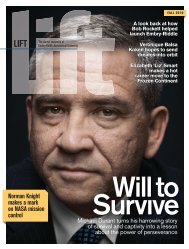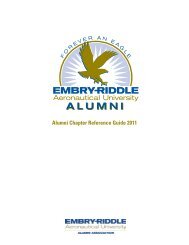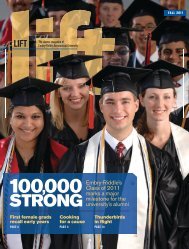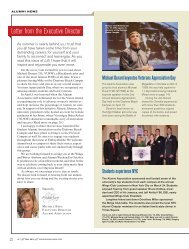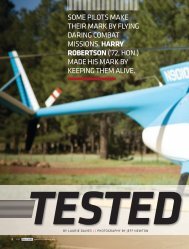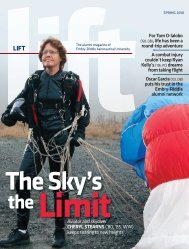Spring 2011 - Embry-Riddle Aeronautical University Alumni
Spring 2011 - Embry-Riddle Aeronautical University Alumni
Spring 2011 - Embry-Riddle Aeronautical University Alumni
- No tags were found...
Create successful ePaper yourself
Turn your PDF publications into a flip-book with our unique Google optimized e-Paper software.
STRAIN SHOWS ONYOUNG FACES NOWSTRUGGLING TOFIND FACTS, PLAYHUNCHES, RECALLTHEIR STUDIES.Demand grows yearly. GSIS isnow the third-largest program on thePrescott Campus, with more than 200students, 28 of them military veterans,a fast-growing group on campus.In 2010, the school added a Chinesetrack, with a summer study-abroadprogram in China.Today, intelligence and securitydemands require more from nations,agencies and professionals than everbefore. With huge numbers of babyboomers set to retire in the next20 years, the imperative for a pipelineof ready-to-work intelligence andsecurity professionals is clear.In October, the efforts of ProfessorBob Baker, GSIS degree programdirector, helped the program get offthe launching pad. The U.S. Office ofthe Director of National Intelligencegranted the university $222,000 tocreate a bachelor’s degree programfor developing a workforce of securityprofessionals with potential to fillhighly coveted positions in the U.S.intelligence community.“It’s not the James Bond profession,”says Baker, “but James Bondis good advertising.”BIG CREDIBILITY, BIG PLANSDr. Jones and Baker bring enormousrespect to their program.Their combined résumés qualifythem to teach students how to dealwith situations ranging from a lonegunman taking over a courthouseto briefing a U.S. President.Dr. Jones grew up in India andPakistan. He spent his early careerworking with the CIA, then consultingon projects in South Asiafor the World Bank and U.S. multinationals.He earned his doctoratefrom The Fletcher School of Lawand Diplomacy, Tufts <strong>University</strong>, aprogram jointly administered withHarvard <strong>University</strong>, before joining<strong>Embry</strong>-<strong>Riddle</strong> in 2000.Baker held key securitypositions with Apple, MidwayAirlines, DHL Worldwide Expressand the Transportation SecurityAdministration, among others. Hecame to GSIS in 2005.GSIS graduates work withthe National Security Agency,CIA, Boeing, World Bank, FBI,Homeland Security Department,Transportation Security Administration,and elsewhere.Jeremy (last name withheldby request) landed with NorthropGrumman. He lauds his GSISexperience.“The program provided me withall the tools I needed to work in theintelligence field,” he says. “Whensome of my co-workers were educatingthemselves on the job, I was a stepahead, thanks to this program.”Another GSIS program alumna,Melissa Napolitano, works as anintelligence-specialist/analyst with theDepartment of Defense. “The programmay be small by university standards,but it offers so much more thanbig campus programs because it is sohighly respected in the intelligencecommunity,” she says.Best of all, GSIS is just gettingstarted.“We envision a day when GSISis a center of academic excellence,”says Dr. Jones. “We’d like a securityoperations track, an Arabic-languageconcentration track. We think teachingcybersecurity is a natural fit with<strong>Embry</strong>-<strong>Riddle</strong>’s strong engineeringand space and physics programs. We’llpush for a master’s degree as thingsmove along.”LESSONS FROM THE REAL WORLD“What are the Americans doing?”Jennie asks. She now has 15 minutesto make a decision. Her choice couldsave—or cost—millions of lives.In the Eagle situation room, eightwall-mounted flat-screen TVs bringJennie and other students breakingnews and updates. Multiple computerand laptop stations provide opensourceintelligence analysis, languagetranslation, interactive exercises andeven weather reports. From an adjacentobservation room, Dr. Jones andProf. Baker, with other faculty andguests, monitor the crisis simulation.The GSIS students have been atthis exercise for four hours now, afterpreparing all semester with research,briefings and analysis. Strain shows onyoung faces now struggling to find facts,play hunches and recall their studies.“Madame Prime Minister,” Patrickannounces, “we ask permission to initiateOperation Cold Start and put allunits on high alert along the borderswith India and Tibet.”It’s as real as it gets in simulation.The scenario has been carefullydrawn up using the interactive modelprovided by the Federal EmergencyManagement Agency, then developedby GSIS faculty. Every element testsstudents’ knowledge and ability asindividuals and as teams to confronttime-sensitive events without completeinformation, then make decisions in atimely, effective manner.Jennie checks the clock. Cold Startwould put half a million Indian troopsacross the Pakistan border. And whatabout those Pakistani nukes? Whatdoes she do?A call comes from the simulation’sWhite House.“Madame Prime Minister,”announces Jeremy, the U.S. President,“we’re mobilizing the U.S. 82ndAirborne ...”Five minutes to make a decision.The future hangs in the balance.12LIFT SPRING <strong>2011</strong> WWW.ERAUALUMNI.ORG


